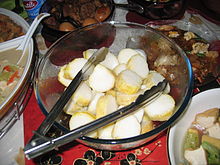Lontong: Difference between revisions
No edit summary |
No edit summary |
||
| Line 1: | Line 1: | ||
[[Image:lontong.jpg|thumb|right|A traditional way of serving lontong]] |
[[Image:lontong.jpg|thumb|right|A traditional way of serving lontong]] |
||
'''Lontong''' (also called [[Ketupat]] is an Asian dish made of compressed rice that is then cut into small cakes. |
'''Lontong''' (also called [[Ketupat]]) is an Asian dish made of compressed rice that is then cut into small cakes. |
||
Popular in [[Indonesia]] and [[Malaysia]], the dish is usually served cold or at room temperature with sauce-based dishes such as [[gado-gado]] and salads, although it can be eaten as an accompaniment to other dishes such as curries. |
Popular in [[Indonesia]] and [[Malaysia]], the dish is usually served cold or at room temperature with sauce-based dishes such as [[gado-gado]] and salads, although it can be eaten as an accompaniment to other dishes such as curries. |
||
Revision as of 15:44, 17 August 2008

Lontong (also called Ketupat) is an Asian dish made of compressed rice that is then cut into small cakes.
Popular in Indonesia and Malaysia, the dish is usually served cold or at room temperature with sauce-based dishes such as gado-gado and salads, although it can be eaten as an accompaniment to other dishes such as curries.
Lontong is traditionally made by partly cooking the rice and packing it tightly into a rolled-up banana leaf. The leaf is then secured and cooked in boiling water for about 90 minutes. Once it is cooled, the rice compacts and can be cut up into bite-sized pieces.
Alternative ways of cooking lontong include placing uncooked rice into a muslin bag then letting the water seep in and cause the rice to form a solid mass (Ingram, 2003).
Lontong is a popular slang word used by Indonesia leading IT company in order to describe useless people, who never give any value.[citation needed]
References
- Ingram, Christine (2003), Rice and Risotto, London, UK: Hermes House, ISBN 1-84309-574-2.
